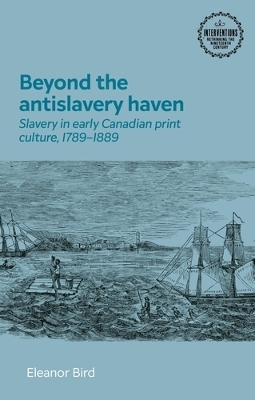
Beyond the Antislavery Haven
Slavery in Early Canadian Print Culture, 1789–1889
Seiten
2025
Manchester University Press (Verlag)
978-1-5261-7429-1 (ISBN)
Manchester University Press (Verlag)
978-1-5261-7429-1 (ISBN)
- Noch nicht erschienen (ca. April 2025)
- Versandkostenfrei
- Auch auf Rechnung
- Artikel merken
This book explores how Canadians and Canadian readers have fashioned their self-image as an antislavery haven, showing a more complicated picture of Canada as a slaveholding, exploitative and racist place. -- .
This book challenges the idealised narrative of Canada as an antislavery haven for self-liberated people to explore Canada’s complicated relationship with slavery. Examining advertisements, abolitionist texts and narratives about slavery in Canadian newspapers and the texts that were printed alongside them, it shows how Canadian readers and enslavers developed an image of themselves as belonging to an antislavery community even while recognising their own complicity in slavery. The book explores narratives that depict the lives of Black settlers in Canada and how slave narratives circulated in Canada. Canada’s relationship with slavery is far more complicated than seeing it as either an antislavery haven or a slaveholding space. Canada was connected to Britain, France, the Caribbean and the United States and this was central to how Canadians and Canadian readers fashioned their self-image in relation to slavery. -- .
This book challenges the idealised narrative of Canada as an antislavery haven for self-liberated people to explore Canada’s complicated relationship with slavery. Examining advertisements, abolitionist texts and narratives about slavery in Canadian newspapers and the texts that were printed alongside them, it shows how Canadian readers and enslavers developed an image of themselves as belonging to an antislavery community even while recognising their own complicity in slavery. The book explores narratives that depict the lives of Black settlers in Canada and how slave narratives circulated in Canada. Canada’s relationship with slavery is far more complicated than seeing it as either an antislavery haven or a slaveholding space. Canada was connected to Britain, France, the Caribbean and the United States and this was central to how Canadians and Canadian readers fashioned their self-image in relation to slavery. -- .
Eleanor Bird is a Research Associate in the Department of English Literature and Creative Writing at Lancaster University -- .
Introduction: The construction of Canada as an antislavery haven in transatlantic print culture
1 The representation of slavery in Quebec’s newspapers, 1789-93
2 Canada in the antebellum slave narrative, 1849-57
3 Thomas Jones in Nova Scotia and New Brunswick: A slave narrative in context, 1851-53
4 Broken Shackles: A narrative of US slavery and Canada’s first major book distributor, 1889
Conclusion
Index -- .
| Erscheint lt. Verlag | 22.4.2025 |
|---|---|
| Reihe/Serie | Interventions: Rethinking the Nineteenth Century |
| Zusatzinfo | 15 black and white illustrations |
| Verlagsort | Manchester |
| Sprache | englisch |
| Maße | 138 x 216 mm |
| Themenwelt | Geisteswissenschaften ► Geschichte |
| Geisteswissenschaften ► Sprach- / Literaturwissenschaft ► Anglistik / Amerikanistik | |
| Geisteswissenschaften ► Sprach- / Literaturwissenschaft ► Literaturgeschichte | |
| Geisteswissenschaften ► Sprach- / Literaturwissenschaft ► Literaturwissenschaft | |
| ISBN-10 | 1-5261-7429-4 / 1526174294 |
| ISBN-13 | 978-1-5261-7429-1 / 9781526174291 |
| Zustand | Neuware |
| Informationen gemäß Produktsicherheitsverordnung (GPSR) | |
| Haben Sie eine Frage zum Produkt? |
Mehr entdecken
aus dem Bereich
aus dem Bereich
Poetik eines sozialen Urteils
Buch | Hardcover (2023)
De Gruyter (Verlag)
CHF 83,90
Buch | Softcover (2024)
belleville (Verlag)
CHF 27,95


